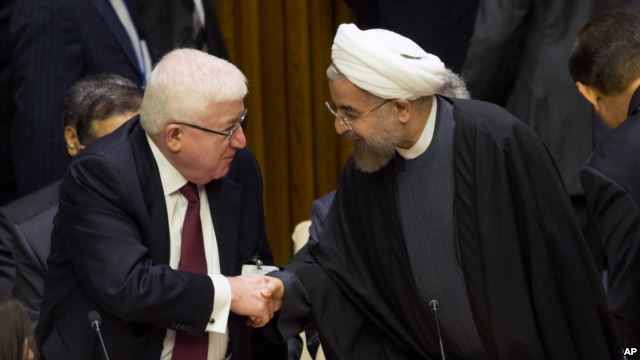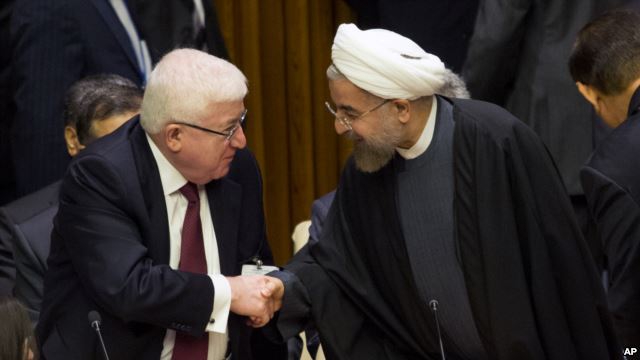 Iraq's President Fuad Masum, left, is greeted by Iranian President Hassan Rouhani as he arrives at the Climate Summit 2014 at U.N. headquarters, Sept. 23, 2014.[/caption]
Iraq's President Fuad Masum, left, is greeted by Iranian President Hassan Rouhani as he arrives at the Climate Summit 2014 at U.N. headquarters, Sept. 23, 2014.[/caption]ISTANBUL�Tehran�s growing sway in the Middle East is stoking Sunni Muslim fears in the region.
From Sunni monarchs in the Gulf to Syrian insurgents battling Iran�s ally President Bashar al-Assad there are mounting worries the United States is downplaying Tehran�s imperial aspirations while seeking to pull off a nuclear deal with Iran.
Last week, a senior adviser to Iranian President Hassan Rouhani roiled the region by calling for a union between Iran and Iraq, arguing the geography of the two countries couldn�t be divided, although he noted there are practical obstacles to any unification.
In a March 8 speech to a domestic audience, Ali Younesi, a former intelligence minister, said Iraq, is �the center of Iranian heritage, culture, and identity� and he talked about a �greater Iran� stretching to the Gulf and even parts of the Indian sub-continent.
�We cannot preserve our interests, national security, and historic identity without attention to Iran's regional influence and borders,� Younesi said.
'Born an empire'
He added, "If we disregard the region that lies within our sphere of influence, we will be unable to protect our interests and security. ... Since its inception, Iran has had a global [dimension]; it was born an empire.�
There was immediate pushback by other senior Iranian officials.
One former vice president, Mohammad Ali Abtahi, warned on a Facebook posting that such rhetoric would �be construed as the same threatening talk of Ahmadinejad,� Rouhani�s hardline predecessor as president. He cautioned, �Irrespective of their governments, people have a sensitivity to their land, and this talk provokes people�s sensitivities.�
That it certainly did.
Criticism of Younesi by other Iranian politicians has done little to assuage the worries of Sunni Muslims.
Younesi�s call for a �natural union� between Iran and Iraq outraged regional rivals, who are already alarmed by Iran�s assistance to Iraqi forces battling Islamic State militants in Tikrit and fearful of its sponsorship of Shi'ite militias across Iraq.
With the Iraqi army weakened, the militias are central to turning back the militants' offensive.
�The Iranian regime has every right to be dancing on the rooftops,� the editor-in-chief of the Saudi daily,�Asharq al-Awsat, opined following Younesi�s comments.
Iran�s critics point to a series of remarks by top officials, made almost always to domestic Iranian audiences, that they say point to a determination by Tehran to exploit the turmoil unleashed by the 2011 Arab spring uprisings.
In February, Qassem Soleimani, the commander of the foreign wing of Iran's Revolutionary Guards who is currently helping to direct the battle for Tikrit, boasted at a rally, �We are witnessing the export of the Islamic revolution throughout the region -- from Bahrain and Iraq to Syria, Yemen and North Africa.�
'Threat is growing'
For Saudi commentator Jamal Khashoggi, a onetime adviser to Prince Turki al- Faisal, a former intelligence chief in Riyadh, Iranian triumphalism isn�t just reserved to rhetoric.
"Iran's threat is growing -- either due to Iran's success or to our failures, but Iran is advancing," Khashoggi warned.
Iran "has succeeded in Syria in maintaining Bashar al-Assad, succeeded in Iraq in having all the Shiites on its side and it has expanded now to Yemen," he added.
In Yemen, the Saudis accuse Iran of sponsoring and supplying Houthi rebels, members of the Zaidi sect of Islam, an offshoot of Shi'ite Islam. Last month, the Houthis removed a Saudi-backed president from power in Yemen.
In Syria, the alignment of convenience between the U.S. and Iran when it comes to battling the jihadists of Islamic State sits oddly with their struggle against Tehran�s ally President al-Assad.
�The Obama administration should be careful of Iran,� said Hisham Marwah, vice president of the Syrian National Coalition, the main Western-backed political opposition group.
Marwah added, �We understand that Washington has an objective in Iraq to defeat the Islamic State, but after we would like the U.S. to get Iran to stop supporting Assad. Iran is a problem for all the states in the area, from Saudi Arabia, Jordan, Yemen, the UAE, and it can�t be a real partner in making the Middle East more secure.�
U.S. officials maintain that an Iran that has accepted a curtailment of its nuclear program, a deal that would see crippling economic sanctions on the country lifted, is just the first step in Tehran becoming a more responsible partner in the region.
'A step-by-step process'
�This is a step-by-step process,� a State Department official speaking off the record told VOA.
But Obama officials themselves appear to be grappling in public with how to balance U.S. alliances with the Gulf�s Sunni kingdoms, defeat Islamic State militants and clinch a nuclear deal with Iran.
Last week, questioned by a Senate panel, General Martin Dempsey, chairman of the Joint Chiefs of Staff, acknowledged the difficulties thrown up by Iran�s role in Iraq.
�The activities of the Iranians is a positive thing in military terms against ISIL, but we are all concerned about what happens after the drums stop beating and ISIL is defeated," Dempsey said.
By VOA News











